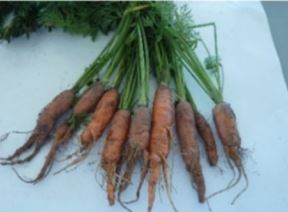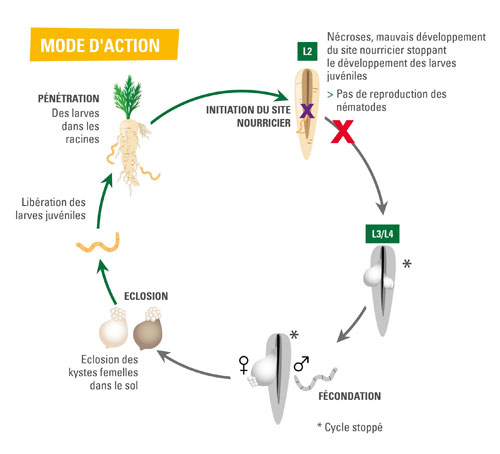France
September 21, 2018
On the occasion of the 2nd International Symposium on Carrot and Other Apiaceae (Poland, 19 - 22 September), Vilmorin - Mikado, the world leader for carrots, presents an innovative and environmentally friendly solution to combat the cyst nematodes Heterodera carotae. Currently in the research phase, this new “soil cleanup” variety could be brought to market in the next 2 to 3 years.
OBJECTIVE: TO REPLACE THE USE OF DICHLOROPROPENE
For a number of years, carrot producers have been making use of a dichloropropene - based nematicide for controlling the nematodes Heterodera carotae. Banned by the European Union in 2009, dichloropropene had been granted use exemptions in France, Spain, Italy and Portugal. In June 2018, the French Ministry of Agriculture definitively banned the use of this molecule. At present there are several thousand hectares in France and Italy that continue to be affected by Heterodera carotae.
APPROACHING 20 YEARS OF COLLABORATIVE RESEARCH
The “AOP Carotte de France” (a French National Association of Carrot Producing Organisations) initiated a collaborative project in 2002, which has since mobilised various partners : INRA ( French National Institute of Agricultural Research) that undertakes fundamental research ; technical partners for the field implementation and definition of the technical protocols (CTIFL: French Interprofessional Technical Centre for Fruit and Vegetables ; and SILEBAN: Investment and Development Company for Vegetable and Horticultural Crops in Lower Normandy, France), and Vilmorin - Mikado for the breeding of varieties. "Vilmorin - Mikado with the involvement of the partners has undertaken to develop a cleaner and more environmentally friendly solution by focusing research efforts on resistance to the nematodes Heterodera carotae" says Jacques - Yves Gueguen, Marketing Portfolio Lead for Roots and Bulbs at Vilmorin - Mikado.

The cyst nematode, Heterodera carotae, is responsible for causing significant yield losses due to a high number of short, split carrots or carrots having a hairy appearance due to excessive production of lateral roots. In production zones in sandy terrain, commercial losses can reach up to 90%.

A WILD TYPE VARIETY THAT WORKS AS A TRAP CROP
Selected from more than 3700 wild plants, this new variety is not a consumable carrot. White in colour, resembling a type of wild carrot, it has a  very large root network, and
very large root network, and
spreading waxy foliage. Endowed with resistance to the nematode Heterodera carotae, the planting of this carrot makes it possible to significantly reduce the population in the soil.
"This “soil cleanup” carrot variety works like a trap crop," explains Laure Barrot, Vilmorin - Mikado Carrot Breeder, "the nematodes entering the rootlets are not able to multiply because of the feeder site being bad. This carrot is thus used to rid the field of pests with a view to future cultivation of a consumable carrot variety, and thereby makes it possible to achieve an efficacy level of between 40% and 80%” (the efficacy of dichloropropene being estimated at 80 - 90%).
A SOLUTION THAT WILL BE MARKETABLE IN 2 TO 3 YEARS
For 10 years, research has been dedicated to identifying the source of nematode resistance and to confirmation thereof by means of laboratory testing. In 2011, Vilmorin - Mikado selected this “soil cleanup” variety, and new tests were conducted through to 2017 (laboratory - and field - based) in order to validate the resistance.
“The first field trials are planned in Normandy with public entity partners (INRA, SILEBAN, CTIFL) : two years of experimentation will be necessary in order to specify the technical protocols. Marketing thereof on the French market, to begin with, is envisaged as of the 2020 - 2021 campaign, " projects Amélie Theriez, Carrot Product Manager for the Europe region.
Vilmorin-Mikado is a Business Unit of Limagrain. Gathering the activities of Vilmorin SA (French seed company) and Mikado Kyowa Seed Co. Ltd (Japanese seed company) since July 2016. As a global seed company, Vilmorin-Mikado has strong basis over the 5 continents and offers a wide and original high-quality range to all the professionals of the vegetable chain. Vilmorin-Mikado is specialized in the creation, production and marketing of vegetable and tree seeds. Entirely dedicated to agricultural professionals, the company reaches a turnover of 238,3 million euros in 2016- 2017 and has 1000 employees worldwide. Vilmorin-Mikado devotes 16% of its turnover to research. Its seed varieties are distributed across more than 100 countries. The world leader for carrots and witloof chicory, Vilmorin-Mikado is also a major player in salad, tomato, pepper, kabocha squash, daikon radish, bunching onion and tree seeds.
Vilmorin-Mikado presente une solution innovante de lutte contre les nématodes Heredodera carotae
A l’occasion du 2nd Symposium International de la Carotte et autres Apiacées (Pologne, 19-22 septembre), Vilmorin-Mikado, le leader mondial pour la carotte, présente une solution innovante et respectueuse de l’environnement pour lutter contre les nématodes à kyste Heterodora carotae. Aujourd’hui au stade recherche, cette nouvelle variété « assainissante » pourrait être commercialisée dans les 2 à 3 années à venir.
OBJECTIF : REMPLACER L’UTILISATION DU DICHLOROPROPENE
Depuis de nombreuses années, les producteurs de carottes ont contrôlé les nématodes Heterodora carotae par l’utilisation d’un nématicide à base de dichloropropène. Interdit par l’Union Européenne en 2009, le dichloropropène a fait l’objet d’une dérogation d’utilisation en France, Espagne, Italie et Portugal. En juin 2018, le Ministère de l’Agriculture français a définitivement interdit l’utilisation de cette molécule. Aujourd’hui plusieurs milliers d’hectares sont touchés par Heterodera carotae en France et en Italie.
BIENTOT 20 ANS DE RECHERCHE COLLABORATIVE
Dès 2002, l’AOP Carotte de France a initié un projet collaboratif qui a mobilisé plusieurs partenaires : l’INRA (Institut National de la Recherche Agronomique) impliqué dans la recherche fondamentale, des partenaires techniques (CTIFL : Centre Technique Interprofessionnel des Fruits et légumes ; SILEBAN : Société d'Investissement Légumière et maraîchère de Basse Normandie) pour la mise en œuvre terrain et la définition de l’itinéraire technique, et Vilmorin-Mikado pour la sélection variétale. « Vilmorin-Mikado s’est engagé avec les différents partenaires à développer une solution plus propre et plus respectueuse de l’environnement en travaillant sur la recherche de résistance aux nématodes Heterodera carotae» précise Jacques-Yves Gueguen, Chef de groupe Marketing pour les espèces Racines et Bulbes chez Vilmorin-Mikado.

Le nématode à kyste, Heterodera carotae, est responsable de pertes de rendement importantes liées à un nombre élevé de carottes courtes, fourchues, ou encore à des carottes ayant un aspect chevelu dû à une forte production de racines latérales. Dans les zones de production en terrain sablonneux, les pertes commerciales peuvent atteindre jusqu’à 90%.
UNE VARIETE DE TYPE SAUVAGE QUI FONCTIONNE COMME UNE CULTURE PIEGE
Sélectionnée à partir de plus de 3700 plantes sauvages, cette nouvelle variété n’est pas une carotte de consommation. De couleur blanche, ressemblant à une carotte de type sauvage, elle possède un réseau racinaire très important, et un feuillage cireux au port étalé. Dotée de la résistance aux nématodes Heterodera carotae, l’implantation cette carotte permet de réduire fortement la population dans le sol.
 « Cette carotte « assainissante » fonctionne comme une culture piège », explique Laure Barrot, sélectionneuse carotte Vilmorin-Mikado, « les nématodes pénétrant dans les radicelles ne peuvent pas se multiplier car le site nourricier est défectueux. Cette carotte permet d’assainir le champ en vue d’une future culture de carotte de consommation, et permet d’atteindre un niveau d’efficacité entre 40% et 80 % » (l’efficacité du dichloropropène étant estimée à 80-90%).
« Cette carotte « assainissante » fonctionne comme une culture piège », explique Laure Barrot, sélectionneuse carotte Vilmorin-Mikado, « les nématodes pénétrant dans les radicelles ne peuvent pas se multiplier car le site nourricier est défectueux. Cette carotte permet d’assainir le champ en vue d’une future culture de carotte de consommation, et permet d’atteindre un niveau d’efficacité entre 40% et 80 % » (l’efficacité du dichloropropène étant estimée à 80-90%).
UNE SOLUTION COMMERCIALISABLE DANS 2 A 3 ANS
Pendant 10 ans, les recherches ont été dédiées à l’identification de la source de résistance aux nématodes et à la confirmation par des tests en laboratoire. En 2011, Vilmorin-Mikado a sélectionné cette variété « assainissante », et de nouveaux essais ont été réalisés jusqu’en 2017 (laboratoire et champ) pour valider la résistance.
« Les premiers essais au champ sont prévus en Normandie avec les partenaires publics (INRA, Sileban, CTIFL) : deux années d'expérimentation seront nécessaires pour préciser l’itinéraire technique. La commercialisation sur le marché français, pour commencer, est envisagée dès la campagne 2020-2021 » prévoit Amélie Theriez, Chef de Produit Carotte pour la zone Europe.
Vilmorin-Mikado est une Business Unit de Limagrain. Depuis Juillet 2016, elle rassemble les activités de Vilmorin SA (semencier français) et Mikado Kyowa Seed Co.Ltd.(semencier japonais). De dimension mondiale, Vilmorin-Mikado est présente sur les 5 continents. Sa large gamme, unique et originale, est destinée à tous les professionnels de la filière potagère. Vilmorin-Mikado est spécialisée dans la création, la production et la commercialisation de semences potagères et d'arbres. Dédiée aux professionnels de l'agriculture, la Business Unit a enregistré un chiffre d'affaires de 238,3 millions d'euros en 2016 - 2017, avec un effectif de 1000 collaborateurs. Vilmorin-Mikado consacre 16 % de son chiffre d'affaires à la recherche. Ses variétés de semences sont distribuées dans plus de 100 pays. Leader mondial pour la carotte et la chicorée witloof, Vilmorin-Mikado est un acteur majeur pour la salade, la tomate, le poivron, la courge kabocha, le radis daikon, le « bunching onion » (oignon botte) et les semences d’arbres.